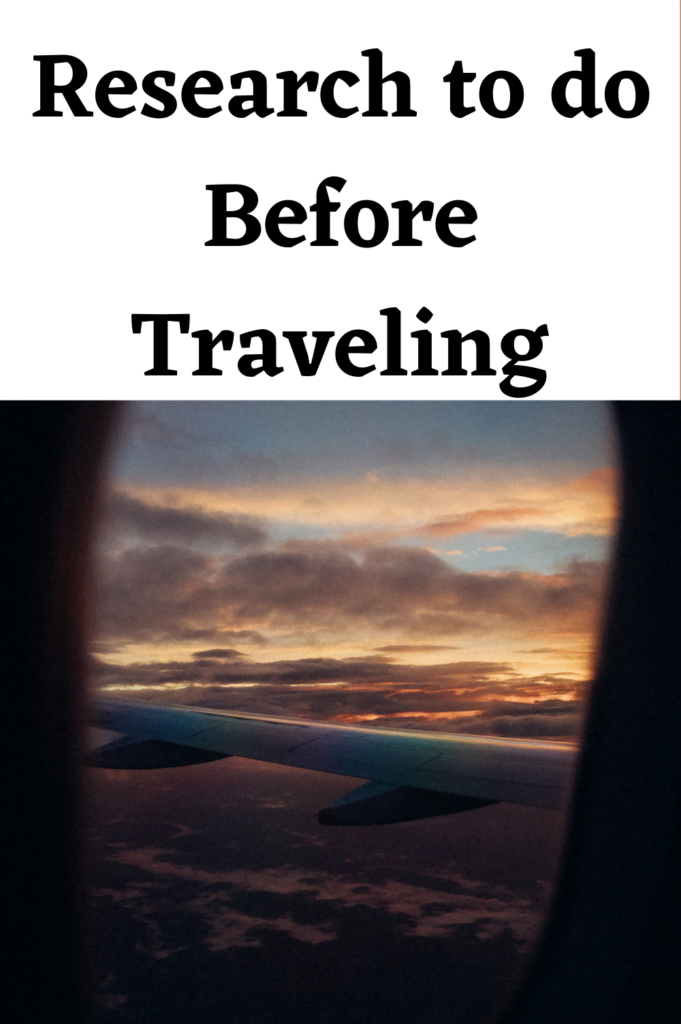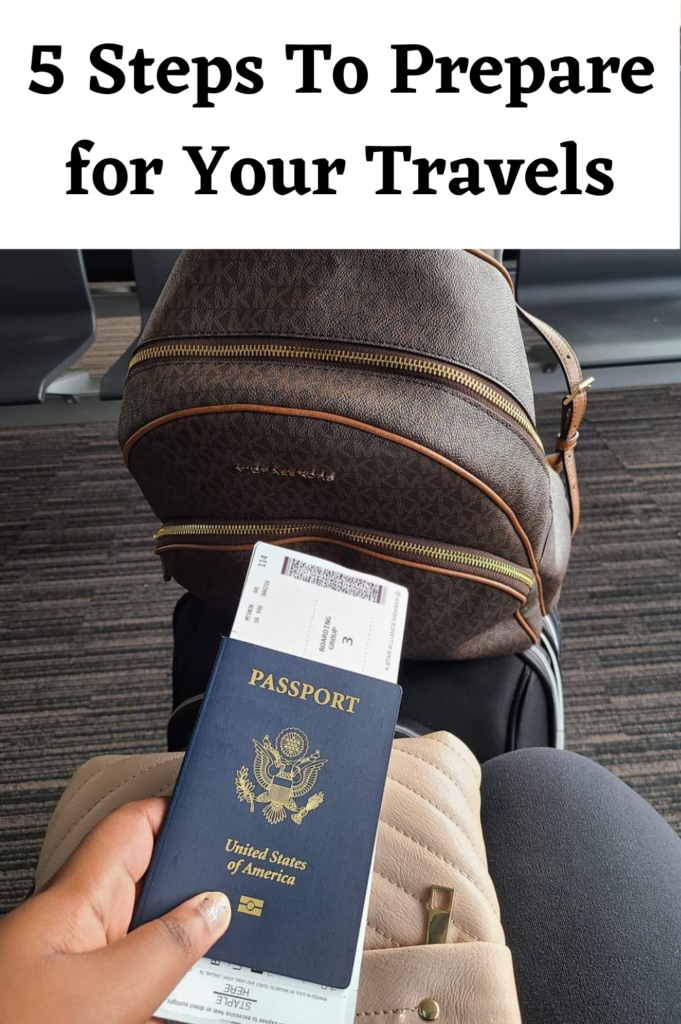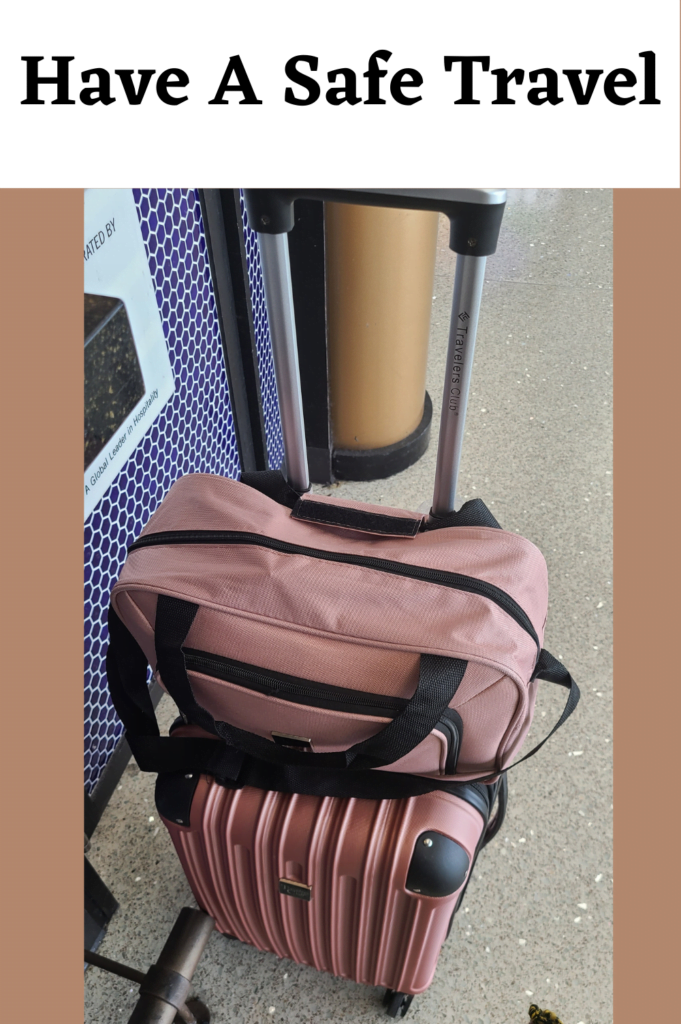Dear first-time or seasoned travelers,
The new year has come, and you have set your travel goals. You wrote down your travel goals, read the travel planning for the new year blog post, and decided where to go. Now, it is time to put your goal into action and manifest it. It is time to transition from travel planning goals to travel destination planning. However, how do we go about it? Where do you start? This post will focus on travel preparation by providing five critical travel steps.
It recently dawned on me how much I neglect doing serious planning whenever I travel. When I went to China, it was a faculty-led program through my university, so I am sure the people in charge would only approve a program if they were sure of the location. All I had to do was take everyday precautions in my regular life. When I went to France and Belgium, the fact that I had some form of support and reported to the Fulbright Commission in the Belgium case and my alma mater in the France case made me never have to be alone in the travel planning.

I started doing in-depth planning when I started solo traveling. I also started doing rigorous planning after someone broke into my Airbnb, and I found out where I was staying was prone to house and car breaking. After experiencing those two events, I started utilizing my research skills to prepare for any upcoming trip. Recently, I have been busy planning my move to Washington, D.C.
During my moving preparations, I spent more time researching and understanding the layouts of D.C., its history, and crime reports than planning for anything in my life. Although I visited D.C. several times and fell in love with the city, I still felt I did not know much about our nation’s capital. In D.C., I was staying on 14th Street, a few steps away from the White House. I visited federal buildings and interacted with attractions around those famous landmarks. Therefore, it would be irrational to think that my limited experience in those sheltered neighborhoods gave me a complete understanding of life in Washington, D.C. Hence, I had to take several steps to prepare for my move. The same advice goes for when you are traveling.
The Importance of Preparation
It is no secret that in life, everything starts with preparation. There are many benefits to being prepared. Preparation increases the chance of success in whatever you do. When you are ready, you can thrive in any situation. Good preparation enhances your confidence and ability to deal with challenges that may come your way, qualities that you need when embarking on a travel journey.
Whether you are traveling for the first time or are a seasoned traveler, no one should leave home to travel without adequate preparation for the place they are hoping to move to or visit. To ensure a safe and enjoyable travel experience, you must prepare yourself and your trip before buying your flight.
Last year, around this time, it dawned on me that I had two trips coming up. One trip was to New Orleans for the week of March 13th. The other trip was to Milan for my mother’s birthday. Traveling is exciting, but before getting to your destination, there are steps that you need to take to make sure your trip will run smoothly. Because I was busy, I forgot the necessary steps I needed to take before my trip. I thought I should wing it the way I did when I was in Europe. Although it is fun to want to be surprised(sometimes), being prepared and aware of ‘what might be’ is essential. Hence, here are the five steps to prepare for your travels.
Here are the five steps to prepare for your travels.
- Learn about where you are going.
Whether you are planning to go abroad, to a different state, or to another city in your state, it is crucial to take the time to learn about the places you are traveling to. Without proper research before traveling, you may not enjoy yourself because often, we travel with the illusion of what a place looks like because of what we have seen in movies or the perfectly curated pictures on Instagram. When I was going to Paris, I did not research the city. I was going by the things I have heard of Paris.
I was going with the illusions of Paris that I had seen in Hollywood movies or imagined. I never thought I would not like Paris at first sight. I never thought I would live in one of the most famous cities in the world for almost a year and not find it as fascinating as I thought. Because I focused on the thought of Paris and not the holistic view of Paris, I experienced a cultural shock. When I found out I was attending a conference in New Orleans, it hit me that although I heard about it because of Mardi Gras, I did not know much about the city. Therefore, I started educating myself about the city. I wanted to know what to expect. What to see, what to do, where to go, and what to eat. So do yourself a favor and research a destination and not just go somewhere because of the illusion you have of it. Your research should include the following:

- Culture: Understanding the culture of the place you visit is vital. As a foreigner, you must familiarize yourself with local customs and traditions. That is why “when in Rome, do as the Romans do” is a motto to live by when visiting a new land.
- The Law of the Land: following up on the previous part, another aspect to include in your research is understanding the law of the land. There are certain things that, as Americans and Westerners, we find benign but in other countries are serious offenses. A recent story about a woman jailed in Dubai for screaming at a man made a round on social media. It demonstrated the importance of learning about the law of the land of foreign countries so that your paradise plan is manageable.
- Safety Measures/Surroundings: When considering booking a hotel or any accommodation, researching your surroundings and safety measures is vital. Sometimes, because we fantasize about specific places, we need to take the time to analyze the surroundings. A previous post talked about ways to be safe in Paris because, after living there for a year, I discovered that not all parts of Paris are full of roses like we tend to imagine.
- Attractions for tourists: Another aspect to include in your research is tourist attractions. What are the must-do things your destination offers? What experiences do you want to have? If you have always wanted to do something like make your chocolate, can you find that attraction where you are going? Personalize your attraction based on what is popular, what you always wanted to do, and experiences you never thought you’d be interested in but are open to trying.
- Local Hidden Treasures: As someone who lived abroad and experienced life as a local, I can attest that many travelers miss out on discovering their destination’s hidden treasures because they focus too much on the big attractions. Therefore, it is good to research less-favored places. Join Facebook travel groups, read personal testimonies to learn about the areas you are going to, and learn about local hidden treasures you may enjoy.
Proper education about where you hope to visit ensures a safe and enjoyable travel experience. By learning about where you are going, you are ensuring your readiness for whatever you may face. Although you cannot predict your reactions to particular events, your research lets you know who to contact or what to do in an emergency.
- Check that you have proper documentation.
The most important thing to verify when you are traveling is documentation. As Americans, there are places we can go without visas and places where we need visas before traveling. Hence, when researching the country where you want to go, it is important to plan which documentation you will need for that specific country. Moreover, your documentation will depend on the length of stay in that country. Americans can travel to 144 countries without a visa. However, that is only for 90 days. For example, if you wish to visit France for three months, you only need your American passport and suitcase. However, if you are going for more than three months, you need a visa according to the purpose of your duration (for example, school, work, and internships). The best site you need to look at for proper documentation is the Department of State’s website. On this website, you will also see the security levels for each country you wish to travel to. These security levels inform you of each country’s security risks. They are ranked from 1 to 4. 1 being “exercise normal precaution” and 4 representing “do not travel.” This site is a great place to explore during your research state mentioned in step 1.
Update about Traveling to Europe
As an American, you can go to Europe without a visa. However, in 2025(I know it’s a long time from now), travelers from visa-exempt countries, aka the United States and others, will need to submit a form there is new travel authorization form known as the ETIAS.
- The Weather
Although you might think because it is autumn on the East Coast, it is also autumn in other parts of the world. You may be surprised! In 2019, I went to Berkeley during the summer and thought it would be the hottest summer of my life. I did not have a hot girl summer moment. It was cold. I was so surprised. My roommate once said, “This is not SoCal. You were expecting SoCal weather”. I wish someone had told me not all places in California are deserts. Ever since that experience, there has not been a place I have gone without checking the weather. Although it is a given that different locations have different temperatures, it does not hurt to check so you can plan your wardrobe accordingly. Another reason to check the weather is to foresee any changes to your flight before getting to the airport. Some go to airports unprepared for cancellations or delays, then become disappointed when their flights are canceled due to the weather. That is why you should download the weather app and monitor the weather at your destination.

- Pack according to different factors!
Packing is one of the essential parts of traveling. Although we know that one needs to pack their suitcase before traveling, what to pack can be a difficult task. This post discusses the necessary items to pack. It is vital to note that what you choose to pack depends on the duration of your stay. If you are going on a weekend trip, you don’t need a big suitcase unless you like to change clothes every two hours. The other important thing that determines your packing list is the purpose of your travel. If you are going for leisure, then pack up accordingly. If you are traveling for a professional event, your essential items should reflect it.
The other measuring stick for what to pack is the weather. As mentioned in the third point, one of the reasons for knowing the climate as it relates to weather is that you know what to pack. Should you pack warmer clothes or winter clothes? The last thing to consider when packing is the culture of where you are going. Not every country is liberal and dresses as liberal as Americans. Even if you go to a liberal place, there are dress codes that are different than what you are used to. For example, other people do not wear sweatpants outside of their homes. If they see you with it, their first thought is you are going or coming back from a workout. (No yoga pants either!) So, when packing, consider the dress culture of the place you are traveling to!
- Prepare for foreign currency!
Another thing every traveler should consider when preparing to travel is currency. Regardless of where you are going, you will need cash and must be familiar with currency exchange. Although few countries have the American dollar as their currency, most places do not. Therefore, when preparing to go to country X, you must plan your finances and buy foreign currency. Before diving into why having foreign currency is essential, it is vital to share the new finance travel requirements.
****Recently, there was a debate on whether it was fair for Brazil to ask for financial statements as part of their visa-granting requirements. Although some Americans felt it was unfair, this rule is not unheard of. Foreigners coming to the United States must prove that they have sufficient money as part of their visa application.****
Moreover, aside from this rule, having more than enough finances when traveling is vital because of uncertainty and unplanned events. As a Gen Z traveler who always felt like she was born in the wrong generation, my boomer-thinking self always carries cash with me, especially when traveling. The first time I traveled with a friend, she asked me whether or not I was going to France with money on me. I always thought that everyone had foreign currency on hand. However, she told me she didn’t trust herself to carry thousands of Euros in cash through the airport. On the other hand, I had five thousand euros in cash before going to France and did so every time I traveled to different cities or countries abroad.
Anyone traveling should have the country’s currency on hand. Here are some reasons: Sometimes, currency exchange abroad costs more than exchanges at your local bank. Second, it is better for budgeting because you can tangibly see how much you are taking out and how much you have left. Third, It is a way to minimize international transaction fees when you use your bank cards. Some banks, like Bank of America, have travel cards that waive international transaction fees. However, some people don’t want to apply for another bank debit or credit card. I also do not want to close an account I have had for a long time to open a new one that will waive the international transaction fee. To escape the hassle, I prefer having cash. If I plan to travel for a long duration, I open a foreign bank account and use that card instead. In a future post, we will discuss opening a foreign bank account and the dos and don’ts.

In conclusion, to have a successful travel journey, one must prepare and take the necessary steps to ensure confidence about the place they want to visit. The five steps listed give travelers a chance to get to know their destination in depth and understand the laws of the environment in which they hope to create a memorable experience. Thank you for reading! I hope you find this helpful information.
Let us know your other travel preparation tips in the comment box below. You may also contact us with more travel-related questions.
Until next time, Safe Travels!
Xoxo,
Cy
Leave a Reply
You must be logged in to post a comment.